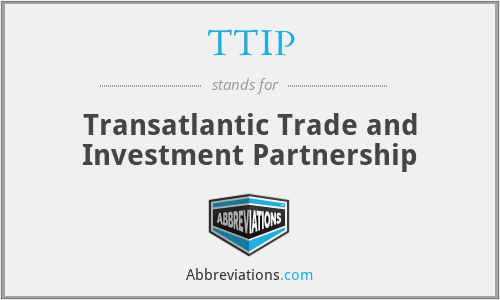What does TTIP mean in Governmental?
This page is about the meanings of the acronym/abbreviation/shorthand TTIP in the field in general and in the Governmental terminology in particular.
Transatlantic Trade and Investment Partnership
Submitted by JP03 on April 17, 2014
Translation
Find a translation for Transatlantic Trade and Investment Partnership in other languages:
Select another language:
- - Select -
- 简体中文 (Chinese - Simplified)
- 繁體中文 (Chinese - Traditional)
- Español (Spanish)
- Esperanto (Esperanto)
- 日本語 (Japanese)
- Português (Portuguese)
- Deutsch (German)
- العربية (Arabic)
- Français (French)
- Русский (Russian)
- ಕನ್ನಡ (Kannada)
- 한국어 (Korean)
- עברית (Hebrew)
- Gaeilge (Irish)
- Українська (Ukrainian)
- اردو (Urdu)
- Magyar (Hungarian)
- मानक हिन्दी (Hindi)
- Indonesia (Indonesian)
- Italiano (Italian)
- தமிழ் (Tamil)
- Türkçe (Turkish)
- తెలుగు (Telugu)
- ภาษาไทย (Thai)
- Tiếng Việt (Vietnamese)
- Čeština (Czech)
- Polski (Polish)
- Bahasa Indonesia (Indonesian)
- Românește (Romanian)
- Nederlands (Dutch)
- Ελληνικά (Greek)
- Latinum (Latin)
- Svenska (Swedish)
- Dansk (Danish)
- Suomi (Finnish)
- فارسی (Persian)
- ייִדיש (Yiddish)
- հայերեն (Armenian)
- Norsk (Norwegian)
- English (English)
Definition
What does TTIP mean?
- Transatlantic Trade and Investment Partnership
- The Transatlantic Trade and Investment Partnership (TTIP) is a proposed trade agreement between the European Union and the United States, with the aim of promoting trade and multilateral economic growth. According to Karel de Gucht, European Commissioner for Trade between 2010 and 2014, the TTIP is the largest bilateral trade initiative ever negotiated, not only because it involves the two largest economies in the world but also "because of its potential global reach in setting an example for future partners and agreements".Negotiations were halted by President Donald Trump, who then initiated a trade conflict with the EU. Trump and the EU declared a truce of sorts in July 2018, resuming talks that appeared similar to TTIP. On 15 April 2019, the negotiations have been declared "obsolete and no longer relevant" by the European Commission.The reports on the ongoing negotiations and the contents of the negotiated TTIP proposals are classified from the public, and can be accessed only by authorised persons. Multiple leaks of proposed TTIP contents into the public caused controversy.The European Commission says that the TTIP would boost the EU's economy by €120 billion, the US economy by €90 billion and the rest of the world by €100 billion. According to Anu Bradford, law professor at Columbia Law School, and Thomas J. Bollyky of the Council on Foreign Relations, TTIP aims to "liberalise one-third of global trade" and could create millions of new jobs. A Guardian article by Dean Baker of the US thinktank Center for Economic and Policy Research argued that the economic benefits per household would be relatively small. According to a European Parliament report, impacts on labour conditions range from job gains to job losses, depending on economic model and assumptions used for predictions.The agreement has been criticized and opposed by some unions, charities, NGOs and environmentalists, particularly in Europe. The Independent describes common criticisms of TTIP as "reducing the regulatory barriers to trade for big business, things like food safety law, environmental legislation, banking regulations and the sovereign powers of individual nations", or more critically as an "assault on European and US societies by transnational corporations". The Guardian noted the criticism of TTIP's "undemocratic nature of the closed-door talks", "influence of powerful lobbyists", TTIP's potential ability to "undermine the democratic authority of local government", and described it as "the most controversial trade deal the EU has ever negotiated". German economist Max Otte argued that by putting European workers into direct competition with Americans (and in effect, because of the North American Free Trade Agreement, with Mexicans and Canadians), TTIP would negatively impact the European social models. An EU direct democracy mechanism, the European Citizens' Initiative, which enables EU citizens to call directly on the European Commission to propose a legal act, acquired over 3.2 million signatures against TTIP and CETA within a year.
Embed
Citation
Use the citation below to add this abbreviation to your bibliography:
Style:MLAChicagoAPA
"TTIP." Abbreviations.com. STANDS4 LLC, 2024. Web. 27 Apr. 2024. <https://www.abbreviations.com/term/1494935>.



Discuss this TTIP abbreviation with the community:
Report Comment
We're doing our best to make sure our content is useful, accurate and safe.
If by any chance you spot an inappropriate comment while navigating through our website please use this form to let us know, and we'll take care of it shortly.
Attachment
You need to be logged in to favorite.
Log In